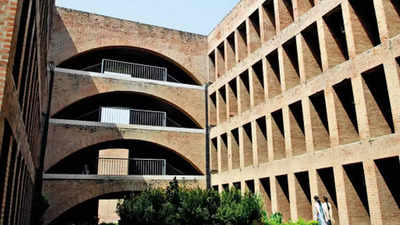- News
- City News
- ahmedabad News
- Gujarat: IIM-Ahmedabad, IIT-Gandhinagar wrap students in bio-bubble
Trending
This story is from January 17, 2022
Gujarat: IIM-Ahmedabad, IIT-Gandhinagar wrap students in bio-bubble
The third wave has prompted premier institutes to create bio-bubbles — a concept popularized last year by sporting events where fully vaccinated individuals are not allowed to mingle with the outside world and vice versa, to rein in any major outbreak and ensure students remain on

An IIM-Ahmedabad spokesperson told TOI that resident students are allowed on campus, even as the classes are conducted online.
AHMEDABAD: The third wave has prompted premier institutes to create bio-bubbles — a concept popularized last year by sporting events where fully vaccinated individuals are not allowed to mingle with the outside world and vice versa, to rein in any major outbreak and ensure students remain on campus.
To put things in perspective, at IIM Ahmedabad (IIM-A) the first fortnight of January has recorded 113 Covid cases, at an average of 7.5 cases daily.At IIT Gandhinagar (IIT-Gn), the officials said "a few new mild cases have been recorded, the new cases are quite mild and recovery is fast". IIM-A has, since the start of the pandemic, recorded 579 cases, whereas IIT-Gn had recorded 267 cases on campus by the end of the second wave.

An IIM-A spokesperson told TOI that resident students are allowed on campus, even as the classes are conducted online. "All movements are subject to the permission from the Students Activities Office (SAO). Gatherings are not allowed and visits from the outside are subject to purpose – virtual meetings are encouraged," said the spokesperson.
At both the institutes, the isolation period of seven days upon arrival and negative RT-PCR report are mandatory to be on the campus. Outside food is also restricted to some extent. Some other residential campuses have also put stringent restrictions for those wishing to stay in the city.
The plans to open the campuses for students has also taken a backseat. While CEPT University has shifted its convocation in January online, several youth festivals – generally taking place in January – would also take place online in the majority of the institutes.
"We had planned to open the campus for offline studies from January. But given the recent surge in cases, we would continue the education in online mode," said Dr. Jagadeesh Chandra T G, registrar of GNLU. "We have also asked the LLM students staying on the campus to vacate hostels. Accordingly, we do not have any students on campus now."
To put things in perspective, at IIM Ahmedabad (IIM-A) the first fortnight of January has recorded 113 Covid cases, at an average of 7.5 cases daily.At IIT Gandhinagar (IIT-Gn), the officials said "a few new mild cases have been recorded, the new cases are quite mild and recovery is fast". IIM-A has, since the start of the pandemic, recorded 579 cases, whereas IIT-Gn had recorded 267 cases on campus by the end of the second wave.

An IIM-A spokesperson told TOI that resident students are allowed on campus, even as the classes are conducted online. "All movements are subject to the permission from the Students Activities Office (SAO). Gatherings are not allowed and visits from the outside are subject to purpose – virtual meetings are encouraged," said the spokesperson.
Likewise, at IIT-Gn, gathering of more than four persons is discouraged. A senior official told TOI that student volunteers are appointed to ensure that Covid protocols are followed. "Those not wearing masks are fined Rs 1,000. Outside entry is only through prior approval. Double vaccination certificate and taking the temperature is mandatory," said the official.
At both the institutes, the isolation period of seven days upon arrival and negative RT-PCR report are mandatory to be on the campus. Outside food is also restricted to some extent. Some other residential campuses have also put stringent restrictions for those wishing to stay in the city.
The plans to open the campuses for students has also taken a backseat. While CEPT University has shifted its convocation in January online, several youth festivals – generally taking place in January – would also take place online in the majority of the institutes.
"We had planned to open the campus for offline studies from January. But given the recent surge in cases, we would continue the education in online mode," said Dr. Jagadeesh Chandra T G, registrar of GNLU. "We have also asked the LLM students staying on the campus to vacate hostels. Accordingly, we do not have any students on campus now."
End of Article
FOLLOW US ON SOCIAL MEDIA










